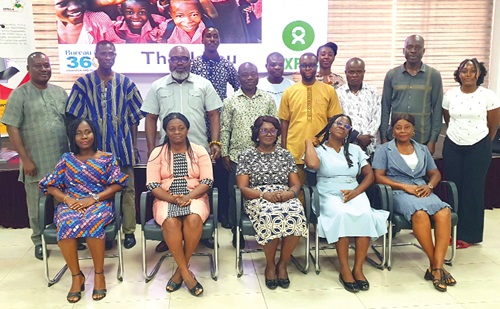FRICA Education Watch (Eduwatch), an advocacy organisation, has proposed the promotion of assertiveness and leadership skills for girls in the Standard-Based Curriculum (SBC).
It said the curriculum should embed structured opportunities for girls to lead group tasks, present ideas, and engage in public speaking across subjects, especially in STEM.
Moreover, it said it should encourage positive masculinity: introduce content and activities that help boys critically reflect on gender norms, respect girls’ rights, and take active roles in promoting gender equality.
“The MoE should adopt robust Monitoring Frameworks: The MoE and its regulatory agencies (e.g., NaCCA, GES) should adopt a robust Monitoring and Evaluation (M&E) framework for tracking purposes,” Eduwatch said in its recommendations following a study it conducted.
The study: A Gender Transformative Review of the Standard-Based Curriculum (KG-Primary 6) said the curriculum missed the opportunity to promote assertiveness in girls, a report by the Africa Education Watch (Eduwatch).
It said although there was some minimum content across subjects that encouraged girls to question norms, build confidence or engage in leadership roles, "the curriculum does not provide structured opportunities to develop assertiveness or empower girls as active learners and leaders".
The research was carried out in Ga East in the Greater Accra Region and Ayensuano in the Eastern.
Areas
It covered four subjects - English, Science, Mathematics and Our World, Our People (OWOP).
In the key findings presented at a stakeholder engagement today (Thursday), the report said basic gender awareness was evident in the SBC in the use of gender-neutral terms such as “all learners,” “they/them”).
It said the SBC aligned with 21st-century competencies but lacked depth in gender inclusion.
"No guidance on assessing gender-related competencies or addressing gender disparities.”
"Exemplars lack balance in representing boys and girls; no inclusive or empowering scenarios. Inclusion mentions special needs, but gender differences are not explicitly addressed.
Digital literacy ignores gendered access and usage patterns," it said.
Again, it said assessment tools such as observation and portfolios did not reflect gender responsiveness.
Overall, it said there was gender-awareness at the surface level but not gender-transformative.
A Team Member of the Bureau for Research and Innovation (BRI), which did the research for Eduwatch, Genevieve Mensah, said, among other things, that the curriculum used gender-neutral language, but lacked intentional strategies to promote girls’ assertiveness, leadership or empowerment.
She said there was absence of critical gender content and that there was no structured guidance or narratives addressing gender equity, stereotypes, or assertiveness-building.
Recommendations
Among the recommendations, she said there was the need to develop practical, classroom-based gender-transformative materials.
Teachers, she said required accessible, context-specific materials to effectively integrate gender equity into everyday classroom practice.
“These may include visual aids, activity guides, inclusive storybooks, posters, and differentiated lesson plans,” she said.
A board member of Eduwatch, Dorothy Konadu, said the review of the curriculum, which was conducted with support from Oxfam, under SP II Project, revealed that the curriculum, though inclusive in language, had yet to fully address the deep-rooted gender inequalities that shaped learners’ experiences, both in and outside the classroom.
The Executive Director of Eduwatch, Kofi Asare, said, “If we cherish values relating to the assertiveness of girls for instance, it is important that the curriculum must make them assertive.
There are some values that depend on the assertiveness of girls – if assertiveness is not there, those values cannot stick”

